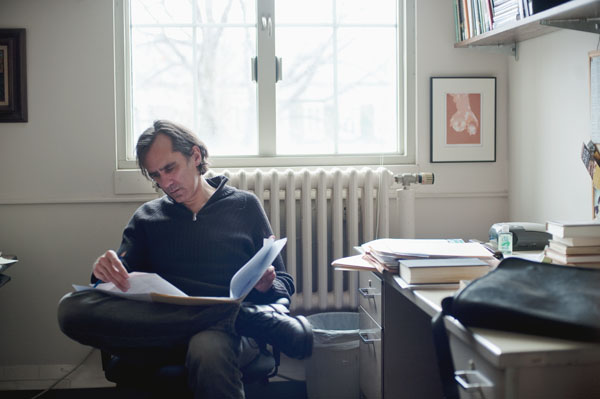Celebrating James Longenbach
Alec Witthohn

Friday, July 29, the literary community lost James Longenbach, a dear critic, poet, and friend. He had been living with kidney cancer for the past six years. The poet passed away at sixty-two.
After his diagnosis, Longenbach persevered, publishing two books of criticism: How Poems Get Made (Norton, 2018) and The Lyric Now (University of Chicago Press, 2020) as well as two books of poetry: Earthling (Norton, 2017) and Forever (Norton, 2021). He was also the Joseph Henry Gilmore Professor of English at the University of Rochester. He made a name for himself both through his critiques of modern and contemporary poetry and through his lyrical work as a poet himself. Over the years, Longenbach published four poems with Colorado Review and, in 2009, served as the final judge for the Colorado Prize for Poetry, selecting Rob Schlegel’s The Lesser Fields.
Despite his passing, James Longenbach isn’t gone. He lives on in his work. If you haven’t done so, you can visit the Poetry Foundation or Longenbach’s website to read a selection of his most noteworthy pieces. Better still, you might seek out some of his publications at your local library or independent bookstore.
Just this year, Longenbach published “The Interpreter” in our Spring 2022 issue.
“The Interpreter” moves readers, jarringly, through the familiar experiences many of us shared living through the pandemic. But Longenbach expertly combines that familiarity with the offbeat and surprising, shifting deftly through forms and vantage points. He writes short, elemental sections (“Song of Ideas” and “Song of the Wind”) featuring stanzas like:
………….Right above our heads
………….New stars are born.
………….New words occur
………….To us, whole poems.
Following these up with long, matter-of-fact lines: “I was reading Boccaccio. A new virus was discovered in Wuhan: within weeks, an emergency was declared by the World Health Organization.” To me the poem feels deeply studied—with its references to Boccaccio or the German and French vernacular that make up our language—and yet, Longenbach seems constantly in awe of his surroundings, a perpetual noticer.
Of course, fans of Longenbach will recognize this signature use of reference as he contextualizes our own time with that of the bubonic plague as il Certaldése saw it during the quarantine of Florence. Not the first time he’s taken on a famous Italian city. Longenbach published his poem “Venice” in the New Yorker in 2007, in which the only connection between the poem and its title is a three-line vision at the end, reading, “When I first saw San Simeone Piccolo / Floating across the Grand Canal, / I stepped into my mind,” which connects a famous Venetian church to the little carriage house where one of his father’s art patrons lives. In these poems, reference moves us like a portal, imbuing our lives with the gravitas of history and the power of remembrance.
I’m not sure anyone can properly mourn a poet without reading back through their body of work. In each poem waits that same potential to remember, to step through their portals and bring ourselves a little closer to the life of the poet.
We would like to share the first poem Colorado Review published by James Longenbach, in celebration of his life and work. Enjoy.
My Other Self
(Colorado Review, Spring 1998)
I’m walking where ocean thins to nothing
Unaware of what I’ll leave behind—
The cure I’d find in footprints, shells,
Or better, in morphology
Since there are shells enough but little cure.
No house inhabited that is not paid
And dickered for. No desk arranged
But by an order making sense to someone,
Even disarray. No pillow that won’t hide
The stain human effort can’t disguise,
No matter if I’ve scrubbed until
The pattern dwindles and fabric frays,
Accumulating value, in a way—
Nothing to be squandered, lost, or saved,
Unless by wandering a harbor so demure,
So manicured it’s unaware of how
Elements that made it could dismantle
Any structure, large or small,
I’m loosened from the daily surge
And summoned by a legacy:
A perfect body in a soapy blur—
A hummingbird surveying the submerged
Geography, the small interstices
Between water and rock, distinguishing
The shadows from the solid forms
Until it pierces mine, and disappears.
 Alec Witthohn is the Social Media Manager and an associate editor at the Center for Literary Publishing/Colorado Review. He is currently an MFA fiction candidate at Colorado State University.
Alec Witthohn is the Social Media Manager and an associate editor at the Center for Literary Publishing/Colorado Review. He is currently an MFA fiction candidate at Colorado State University.